Welcome to our article where we tackle the question: Are coffee grounds bad for drains? Many of us enjoy a cup of coffee to start our day, but what should we do with the leftover grounds? It’s important to understand the potential impact they can have on our drains and plumbing system.
Coffee grounds should never be put down the drain as they can clump together in water and create clogs in the pipes. Unlike most foods, coffee grounds do not break down and can build up over time, leading to plumbing issues. Other items that should not be put down the drain include grease, starchy foods, fibrous items, and non-food items. If you have already put coffee grounds down the drain and are facing a clog, it’s important to seek professional plumbing help.
Key Takeaways:
- Coffee grounds should not be put down the drain as they can clog pipes.
- They do not break down like most foods and can build up over time.
- Professional plumbing assistance should be sought for clogs caused by coffee grounds.
- Other items that should not be put down the drain include grease, starchy foods, fibrous items, and non-food items.
Why You Shouldn’t Put Coffee Grounds Down the Sink
If you’re wondering whether it’s okay to put coffee grounds down the sink, the answer is a resounding no. While it may seem convenient, disposing of coffee grounds in this manner can have detrimental effects on your plumbing system. Here, we’ll explore the reasons why you should avoid putting coffee grounds down the drain, and the potential plumbing issues that can arise.
The Effects of Coffee Grounds on Plumbing
- Clogs and blockages: Coffee grounds have a tendency to clump together when mixed with water, creating the perfect recipe for clogged drains. Over time, these clumps can accumulate and obstruct the free flow of water through the pipe, leading to slow-draining sinks or even complete blockages.
- Damaged pipes: Unlike most foods, coffee grounds do not easily break down when exposed to water. This means that they can build up over time and create a layer of residue on the inside of the pipes. This residue can eventually cause corrosion and damage to the pipes, potentially leading to leaks and costly repairs.
- Odors and backups: When coffee grounds accumulate in the pipes, they can begin to emit unpleasant odors. Additionally, the buildup can cause backups in the sink, resulting in water overflowing and creating a messy and inconvenient situation.
Instead of disposing of coffee grounds down the sink, it’s recommended to find alternative ways to utilize them or simply throw them in the garbage. Coffee grounds can be used as fertilizer in your garden, added to compost, or even used in skincare as an exfoliator. These methods not only prevent plumbing issues but also provide additional benefits for the environment and your personal care routine.
The Consequences of Putting Coffee Grounds Down the Drain
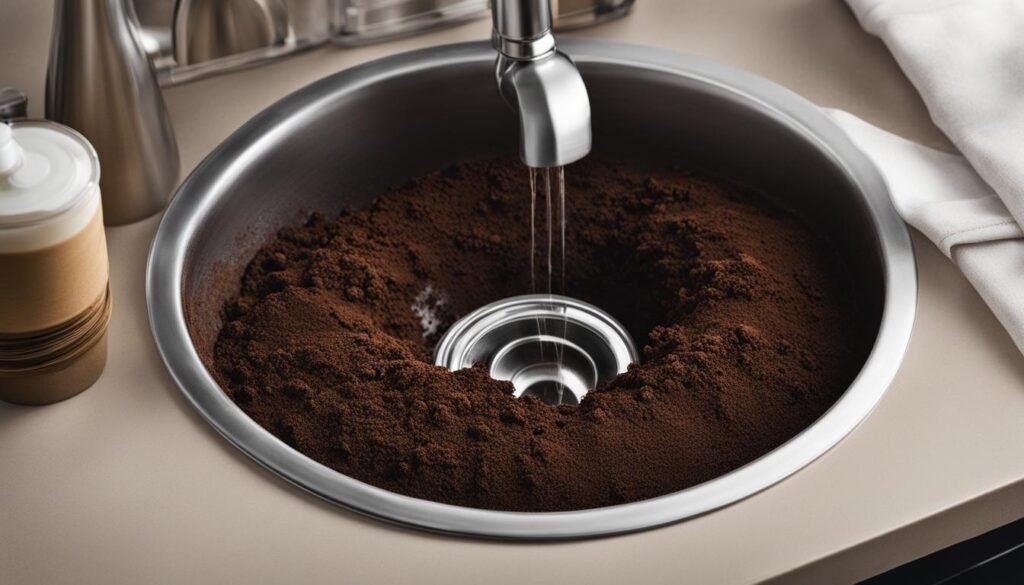
Putting coffee grounds down the drain can have serious consequences for your plumbing system. Over time, the grounds can accumulate and form clumps that restrict water flow. This leads to slow-draining water, unpleasant odors, and potentially even backups in your sink. By understanding the negative effects of coffee grounds on your drains, you can take steps to prevent these issues and keep your plumbing system functioning smoothly.
Here are some of the consequences you may encounter if you put coffee grounds down the drain:
- Drain blockage: Coffee grounds can easily clump together and create blockages in your pipes. These blockages can prevent water from flowing freely, resulting in slow drainage and potential backups.
- Clogged pipes: As coffee grounds accumulate in your pipes, they can create clogs that require professional plumbing assistance to resolve. These clogs can be difficult to remove and may cause damage to your plumbing system.
- Odors and unpleasant smells: When coffee grounds build up in your drains, they can emit unpleasant odors that permeate your kitchen or bathroom. These odors can be difficult to eliminate and may require professional intervention.
Regular drain maintenance is crucial to prevent these consequences and keep your drains clear and functional. By avoiding the disposal of coffee grounds down the drain, you can help maintain the proper flow of water and prevent blockages. Instead, consider alternative uses for coffee grounds, such as using them as fertilizer or composting them.
Remember, your plumbing system is not designed to handle coffee grounds, and improper disposal can lead to costly repairs and inconvenience. By being mindful of what goes down your drain, you can avoid the consequences of coffee grounds and ensure the longevity of your plumbing system.
What to Do If You’ve Put Coffee Grounds Down the Drain
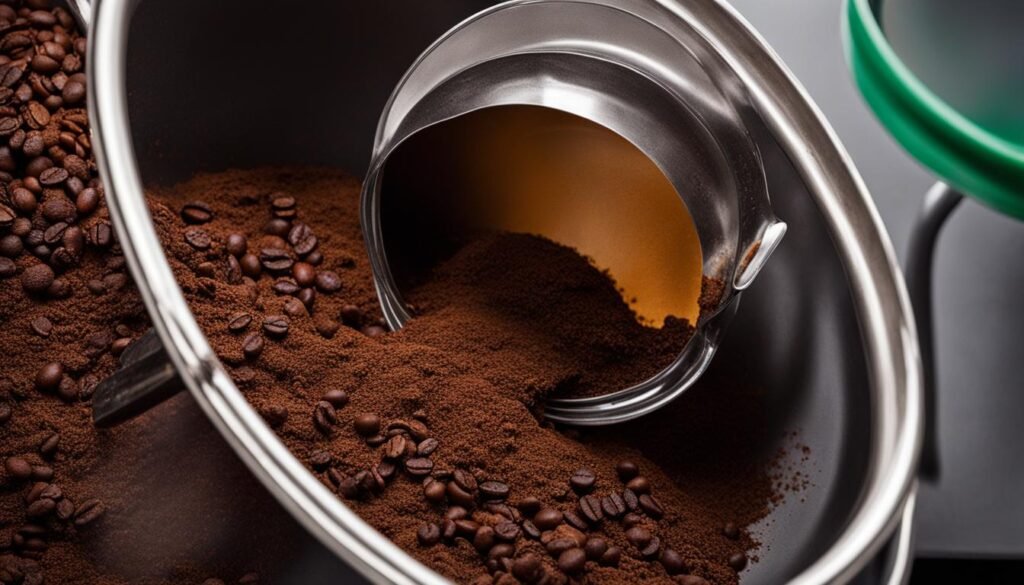
If you’ve accidentally put coffee grounds down the drain, don’t panic. While coffee grounds can cause clogs and plumbing issues, there are steps you can take to mitigate the damage and prevent further problems.
1. Stop Using the Sink
The first thing you should do is stop using the sink immediately. Running water or attempting to flush the grounds down with more water can worsen the clog and make it more difficult to remove. By refraining from using the sink, you can prevent any additional coffee grounds from entering the drain and compounding the problem.
2. Remove Visible Grounds
If you can see coffee grounds floating in the drain, try to remove them using a pair of tongs or a spoon. Be cautious not to push the grounds further into the drain, as this can worsen the clog. By removing as much of the visible grounds as possible, you can potentially improve the drain’s flow and minimize the risk of further blockages.
3. Call a Professional Plumber
Even if you’ve taken steps to remove the visible grounds and the sink appears to be functioning normally, it’s essential to seek professional plumbing assistance. A licensed plumber has the expertise and tools to assess the extent of the clog, clear it effectively, and address any underlying plumbing issues that may have been caused by the coffee grounds. They can also provide guidance on how to maintain your drain properly and prevent future clogs.
4. Practice Proper Disposal
To prevent drain clogs from coffee grounds in the future, it’s important to dispose of them correctly. Instead of putting the grounds down the drain, throw them in the garbage or compost them. Coffee grounds can also be used as a natural fertilizer for plants or repelling insects. By practicing proper disposal methods, you can help maintain a healthy drain and reduce the risk of plumbing issues.
Alternative Uses for Coffee Grounds
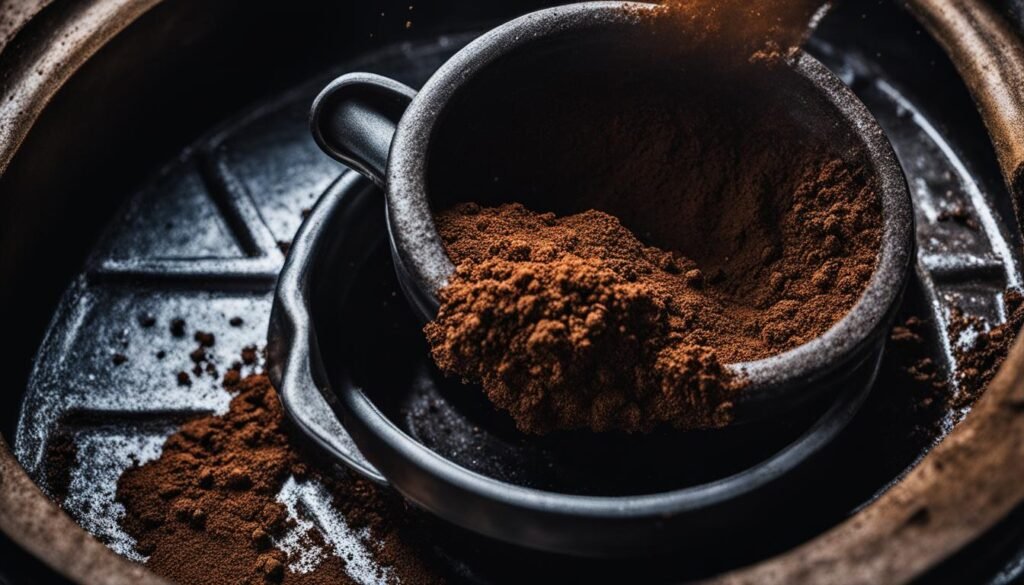
If you’re concerned about the impact of coffee grounds on your drains, fear not! There are plenty of alternative uses for them that can actually be beneficial. Instead of tossing your coffee grounds down the drain, consider these eco-friendly options:
Fertilizer for Your Garden
One great way to repurpose coffee grounds is to use them as a natural fertilizer for your plants. Coffee grounds are rich in minerals like nitrogen and potassium, which can help promote healthy growth and improve soil quality. Simply mix the coffee grounds into the soil around your plants, and watch them thrive!
Composting
Another excellent use for coffee grounds is composting. Coffee grounds provide valuable organic matter to your compost pile, helping to create nutrient-rich soil for your garden. Just add the coffee grounds to your compost bin or pile along with other organic materials, such as vegetable scraps and yard waste.
Natural Insect Repellent
Coffee grounds can also serve as a natural deterrent for unwanted pests in your garden. Sprinkling coffee grounds around the base of your plants can help keep ants, slugs, and even cats away. The strong scent of coffee is unappealing to these pests, making it a safe and effective way to protect your plants.
With these alternative uses for coffee grounds, you can not only avoid clogging your drains but also make a positive impact on your garden and the environment. So, next time you finish brewing your morning cup of joe, think twice before disposing of those grounds down the drain. Give them a new purpose and reap the benefits!
The Myth of Coffee Grounds as Drain Cleaners
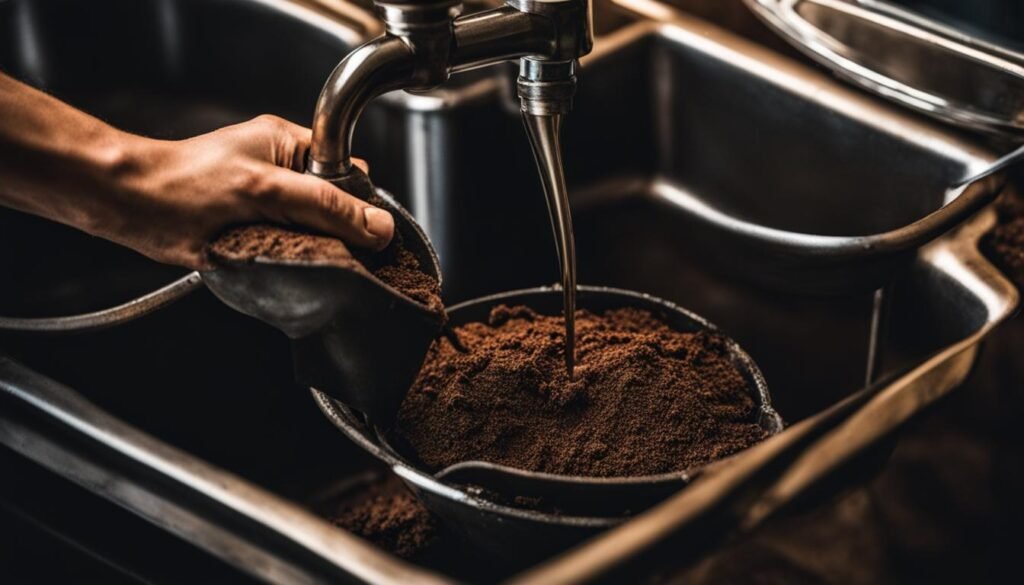
There is a common myth that coffee grounds can be used as an effective drain cleaner. However, this is not true and can actually lead to more plumbing issues. Coffee grounds do not possess any cleaning properties that can unclog drains or freshen them up. In fact, putting coffee grounds down the drain can contribute to clogs and damage to the plumbing system.
It’s important to debunk this myth and emphasize the proper maintenance and disposal of coffee grounds. Instead of using coffee grounds as a drain cleaner, they should be disposed of in the garbage or compost. By doing so, we can avoid the accumulation of grounds in the pipes and prevent potential plumbing problems.
The potential consequences of using coffee grounds as drain cleaners include:
- Clogs: Coffee grounds can clump together in water and create blockages in the pipes, leading to slow-draining water and backups in the sink.
- Damage to plumbing system: Unlike most foods, coffee grounds do not break down easily and can build up over time, causing damage to the pipes and requiring costly repairs.
- Odors: The accumulation of coffee grounds in the pipes can result in unpleasant odors emanating from the drains.
It’s crucial to prioritize proper maintenance and disposal methods for coffee grounds to ensure a healthy drain system. By choosing alternative uses for coffee grounds, such as using them as fertilizer or compost, we can contribute to the well-being of our drains and the environment. Remember, when it comes to drain maintenance, coffee grounds should never be used as a substitute for professional plumbing services.
Importance of Professional Plumbing Services
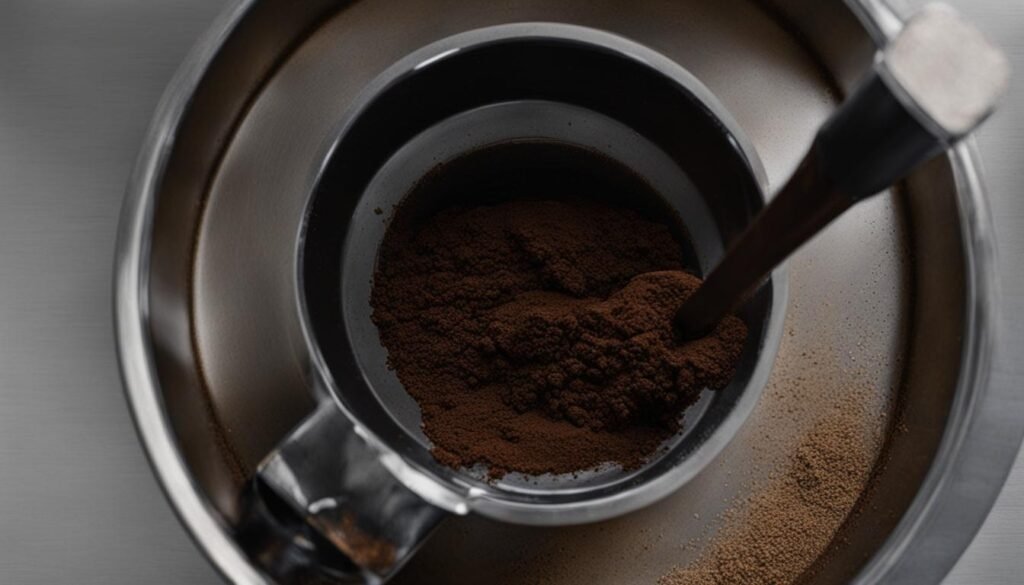
When it comes to dealing with plumbing issues caused by coffee grounds or other factors, seeking professional plumbing services is of utmost importance. Attempting to fix the problem yourself can often lead to further damage and costly repairs down the line. Here are a few reasons why it’s crucial to rely on licensed plumbers:
1. Expertise and Experience
Professional plumbers have the knowledge and experience to accurately diagnose the source of the problem. They understand the complex workings of plumbing systems and can identify any underlying issues that may have contributed to the clog or damage caused by coffee grounds. Their expertise allows for efficient repairs and long-term solutions.
2. Specialized Tools and Equipment
Licensed plumbers have access to specialized tools and equipment that are necessary to effectively address plumbing issues. They can use advanced techniques such as hydro-jetting to clear stubborn clogs and restore proper water flow. By relying on professional services, you can be confident that the job will be done using the most appropriate tools and techniques.
3. Preventive Maintenance
In addition to addressing current plumbing issues, professional plumbers can provide preventive maintenance to help you avoid future problems. They can perform regular inspections, identify potential issues before they escalate, and offer advice on how to properly maintain your drains and plumbing system. Regular maintenance can save you from costly repairs and ensure the longevity of your plumbing system.
By choosing professional plumbing services, you can have peace of mind knowing that your plumbing issues caused by coffee grounds or other factors will be handled efficiently and effectively. Don’t hesitate to seek professional help when facing clogged drains or any other plumbing problems.
Conclusion: Proper Disposal for a Healthy Drain
In conclusion, coffee grounds should never be put down the drain as they can cause clogs and damage to the plumbing system. Unlike most foods, coffee grounds do not break down and can accumulate over time, leading to plumbing issues. It’s important to prevent drain clogs from coffee grounds by disposing of them properly.
To maintain a healthy drain, coffee grounds should be disposed of in the garbage or compost. Instead of putting them down the drain, consider using coffee grounds as fertilizer for your garden or composting them. They can also be used to repel insects or as a natural exfoliator in skincare.
If you have inadvertently put coffee grounds down the drain and are experiencing clogs or other plumbing issues, it is crucial to seek professional plumbing assistance. A licensed plumber can assess the situation, clear the clog, and provide any necessary repairs to restore proper drain functionality. Regular plumbing maintenance can help prevent future issues caused by coffee grounds or other factors.
Remember, proper disposal is key to a healthy drain. By avoiding coffee grounds in the sink and seeking professional help when needed, you can prevent drain clogs and maintain optimal plumbing performance.
FAQ
Are coffee grounds bad for drains?
Yes, coffee grounds can cause clogs and damage to the plumbing system if put down the drain.
Why shouldn’t I put coffee grounds down the sink?
Coffee grounds clump together in water and do not break down like most foods, leading to clogs in the pipes and plumbing issues.
What are the consequences of putting coffee grounds down the drain?
Coffee grounds can accumulate over time, forming clumps that restrict water flow, resulting in slow-draining water, odors, and backups in the sink.
What should I do if I’ve put coffee grounds down the drain?
If you’ve already put coffee grounds down the drain and are facing a clog, it’s important to seek professional plumbing help.
Are there alternative uses for coffee grounds?
Yes, coffee grounds can be used as fertilizer, compost, insect repellent, and skincare exfoliator.
Is it true that coffee grounds can be used as drain cleaners?
No, coffee grounds do not have cleaning properties and should not be used as drain cleaners.
Why are professional plumbing services important?
Professional plumbers have the expertise and tools to identify and repair plumbing issues, preventing further damage and ensuring optimal drain functionality.
What is the proper disposal method for coffee grounds?
Coffee grounds should be disposed of in the garbage or compost to maintain a healthy drain.
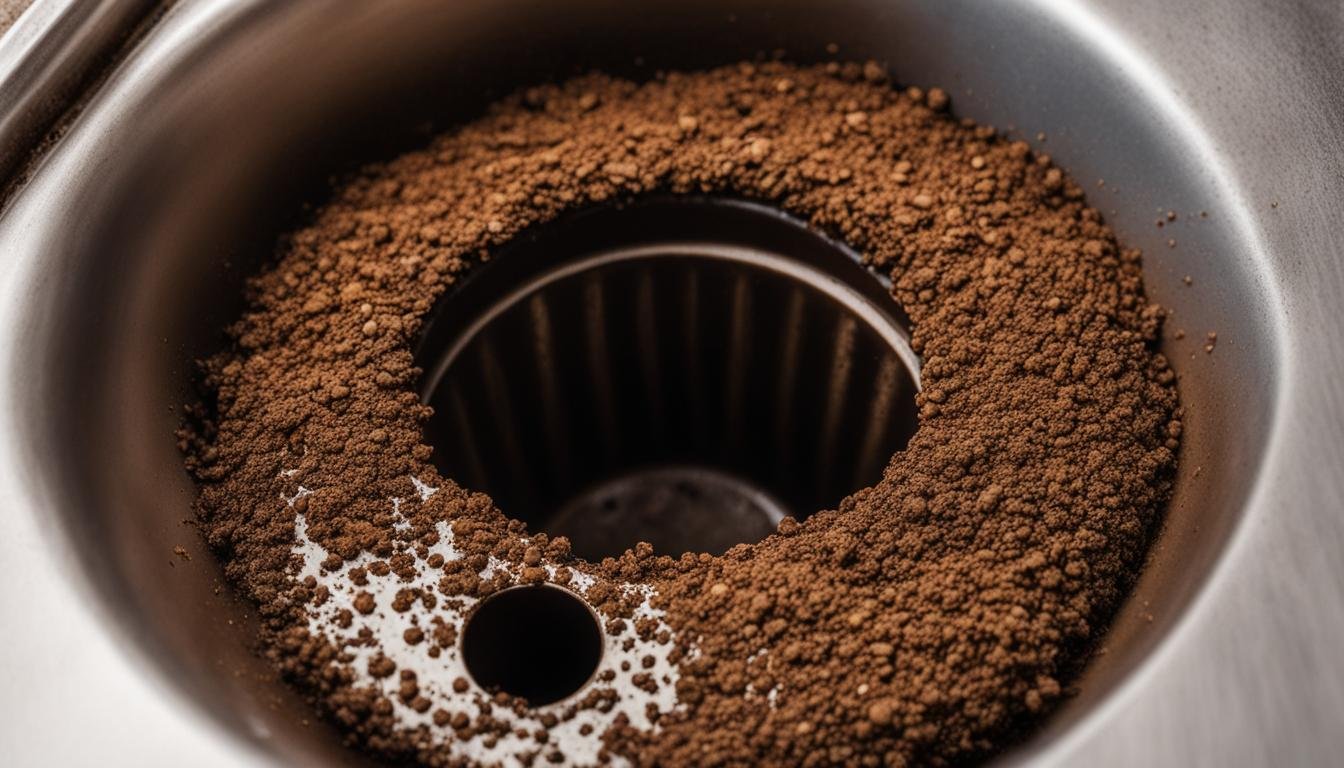
Leave a Reply